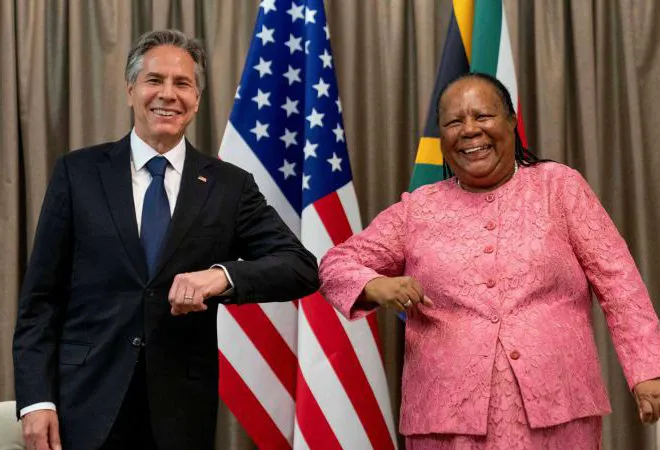
The current global landscape is witnessing increasing polarisation between democratic nations led by the United States (US) and authoritarian regimes coalescing with China. Tensions between the two major powers boiled over following US House Speaker Nancy Pelosi’s visit to Taiwan. This prompted Beijing to launch a large-scale media campaign to gather support and bolster its position on the “One China Policy” from countries across the global South, including Africa. China attempted to frame Pelosi’s visit as a western incursion, positioning itself as a victim. Such messaging may resonate across many African capitals, particularly after NATO’s failed 2011 intervention in Libya.
While political parties of countries like Egypt, Zimbabwe, South Africa, and Tunisia expressed opposition to Pelosi’s visit,
Somalia took it a step forward since the Taiwan issue hits closer to home for Mogadishu than any other African country. Like the Chinese with Taiwan, Somalia contends the breakaway region of Somaliland to be an inalienable part of their country and has been wary of deepening mutual ties between Taiwan and Somaliland in recent years.
The divergent voting patterns and reticence on part of some African countries to outrightly condemn Russian aggression in Ukraine reflected this dilemma.
The US and China’s engagement in Africa are often framed in terms of zero-sum competition over influence and infrastructure investment in the continent. Increasingly, African countries are being reduced to pawns in the geopolitical chessboard and mere battlegrounds for resurgent great power competition—what has been termed the “
New Scramble for Africa”. Despite stipulating their desire to not be used as pawns in proxy rivalries, it is becoming difficult for African leaders to remain quiet and not pick sides. The
divergent voting patterns and reticence on part of some African countries to outrightly condemn Russian aggression in Ukraine reflected this dilemma. Gradually, the task of balancing and maintaining their relationship with both the West and the East is becoming difficult for African countries.
From an African perspective, the costs of taking a stand are too high. Suppose China were to invade Taiwan in the coming days, then an African country supporting the US may risk souring its bilateral relation with China. This situation is particularly of concern for those African countries that are highly indebted to China. On the other hand, the action of outrightly supporting China, given its constant belligerence and challenge to the rules-based international order, risks inviting sanctions from the US and other multilateral bodies.
Amidst these uncertainties, US Secretary of State Antony Blinken kicked off a three-nation African tour in Johannesburg from 7–12 August, paying visits to three countries; South Africa, the Democratic Republic of Congo, and Rwanda. The highlight of the visit was the unveiling of a new “
US Strategy Toward Sub-Saharan Africa”. The strategy “represents a reframing of Africa’s importance to US national security interests,” and attempts to downplay perceptions of the continent as an area of its great-power rivalry with China. In many ways, the new strategy marks a breakaway from the Trump administration’s “Prosper Africa” policy, which was explicitly focused on countering Beijing’s growing influence on the continent.
Main talking points in the strategy
When talking about Africa, the new strategy strikes the right notes. It acknowledges the centrality of the continent to US national interests and its indispensable role in providing global public goods and solving common developmental challenges. This is a notable departure from viewing the continent as a source of threats to a part of the solution, keeping in mind the significant transformations undergoing in the continent’s socio-economic, political, and security landscape.
The strategy “represents a reframing of Africa’s importance to US national security interests,” and attempts to downplay perceptions of the continent as an area of its great-power rivalry with China.
An important issue to note is that the strategy delineates policy towards Sub-Saharan Africa (SSA), which implies that North Africa is essentially being treated as a part of the Middle East/North Africa (MENA) region. This suggests different priorities and initiatives for the MENA region.
There is also an acknowledgement that Washington has largely failed to compete head-on with Beijing in recent years. Despite pouring billions of dollars and investing human resources, the US’ ‘military-first’ mindset has failed to yield desirable outcomes. Therefore, the Biden administration is seeking to prioritise areas of cooperation where it feels it has an advantage over Africa’s partners, namely governance, economic development, and climate. Four primary pillars are identified in the strategy, namely;
- Foster Openness and Open Societies
- Deliver Democratic and Security Dividends
- Advance Pandemic Recovery and Economic Opportunity
- Support Conservation, Climate Adaptation, and a Just Energy Transition
The strategy also mentions working with individual African cities to strengthen links with African diaspora communities in the US, and jointly tackling COVID-19. However, whether any new platforms would be set up for joint engagement in these areas of cooperation remains unclear.
One of the most significant talking points is the willingness of the US to include African voices in the Indo-Pacific discourse. The US for the longest time had a
restrictive and myopic understanding of the contours of the Indo-Pacific as stretching from “Bollywood to Hollywood”. This view tended to ignore the role of the Western Indian Ocean—a strategically critical sub-region of the Indian Ocean—within the broader Indo-Pacific strategy. The US has now recognised that
African states are adopting maritime security policies as part of broader national security strategies. Subsequently, the US is now ready to “facilitate and support new geographic groupings” and “integrate African states in Indian Ocean and Indo-Pacific forums”. This is a welcome development.
The Biden administration is seeking to prioritise areas of cooperation where it feels it has an advantage over Africa’s partners, namely governance, economic development, and climate.
By righting this divergence in strategic mapping, the US has now sent a signal to its close partners like India, Japan, and France of its willingness to collaborate in the Western Indian Ocean to promote maritime security and ensure safer African waters.
Africa’s assessment of Blinken’s visit and the new US strategy
Secretary Blinken’s Africa sojourn comes at a time when the US’ engagement with the continent has been criticised for being preachy and perspective concerning Africa’s relations with foreign partners. A reset and revamp are the need of the hour since Washington’s siloed approach to the region has mostly failed to produce any dividends or leverage its image vis-à-vis China. Rather, the US has been suffering from a
credibility gap and is finding the task of converting capital into influence, difficult. Moreover, the allure of American democracy is incrementally fading, as evidenced by its
dismal human rights record in recent years. Subsequently, US competitors like China and Russia have attempted to exploit the ensuing power vacuum and promote their model of socio-economic development in Africa.
The entire issue of lack of vaccine access or “
Vaccine Apartheid”, faced by African countries at the height of the pandemic is still fresh on its leader’s and public’s mind. African countries lamented the widespread disparity in accessing vaccines and life-saving medical supplies and equipment. Understandably, any US proclamation to support Africa’s pandemic recovery is likely to result in both relief and scepticism. Moreover, at last year’s COP26 climate conference in Glasgow,
African leaders criticised the West for failing to meet its promise of mobilizing US$ 100 billion by 2020 to help developing countries cope with climate change. This promise is unlikely to be met even by 2023. Other initiatives announced by the US like the Blue Dot Network and Build Back Better World (B3W) have until now, failed to finance any projects of consequence in Africa.
Secretary Blinken’s visit comes right on the heels of a recent trip by Russian foreign minister, Sergei Lavrov. Russia’s growing clout in Africa has been a source of major concern for the US.
However, there is a reason for African countries to be cautiously optimistic about the new US policy. Firstly, the strategy begins from the assumption that Africa, as an epicentre of geopolitical shifts, is core to US foreign policy. It affirms the African agency and acknowledges the continent’s ability to participate in consequential global conversations as equal partners. Secondly, the de-emphasis on China and Russia, and downplaying of the narrative of Africa as a battleground for geopolitical competition, is a positive development. Secretary Blinken’s visit comes right on the heels of a recent trip by Russian foreign minister, Sergei Lavrov. Russia’s growing clout in Africa has been a source of major concern for the US. The US contends that
Moscow’s political theatrics is equally aimed at expanding its influence and signalling to the world that Russia continues to have allies in some parts of the world.
Lastly, a huge reason for optimism from the African side stems from the fact that sensitivities to race, and the imperative to place people of colour at the heart of US-Africa relations,
play in the new U.S. strategy. This is reflected by a string of political appointments of Africanists and African Americans in the Biden Administration like Judd Devermont, Special Assistant to POTUS and Senior Director for African Affairs at the White House National Security Council, and Monde Muyangwa, Assistant Administrator for Africa at United States Agency for International Development (USAID).
The new strategy certainly marks a fresh beginning for US-Africa relations. However, going forward, much of its success would be contingent upon the US’ ability to deliver on its promises by allocating the necessary budgets and resources.
The views expressed above belong to the author(s). ORF research and analyses now available on Telegram! Click here to access our curated content — blogs, longforms and interviews.



 The current global landscape is witnessing increasing polarisation between democratic nations led by the United States (US) and authoritarian regimes coalescing with China. Tensions between the two major powers boiled over following US House Speaker Nancy Pelosi’s visit to Taiwan. This prompted Beijing to launch a large-scale media campaign to gather support and bolster its position on the “One China Policy” from countries across the global South, including Africa. China attempted to frame Pelosi’s visit as a western incursion, positioning itself as a victim. Such messaging may resonate across many African capitals, particularly after NATO’s failed 2011 intervention in Libya.
While political parties of countries like Egypt, Zimbabwe, South Africa, and Tunisia expressed opposition to Pelosi’s visit,
The current global landscape is witnessing increasing polarisation between democratic nations led by the United States (US) and authoritarian regimes coalescing with China. Tensions between the two major powers boiled over following US House Speaker Nancy Pelosi’s visit to Taiwan. This prompted Beijing to launch a large-scale media campaign to gather support and bolster its position on the “One China Policy” from countries across the global South, including Africa. China attempted to frame Pelosi’s visit as a western incursion, positioning itself as a victim. Such messaging may resonate across many African capitals, particularly after NATO’s failed 2011 intervention in Libya.
While political parties of countries like Egypt, Zimbabwe, South Africa, and Tunisia expressed opposition to Pelosi’s visit,  PREV
PREV


